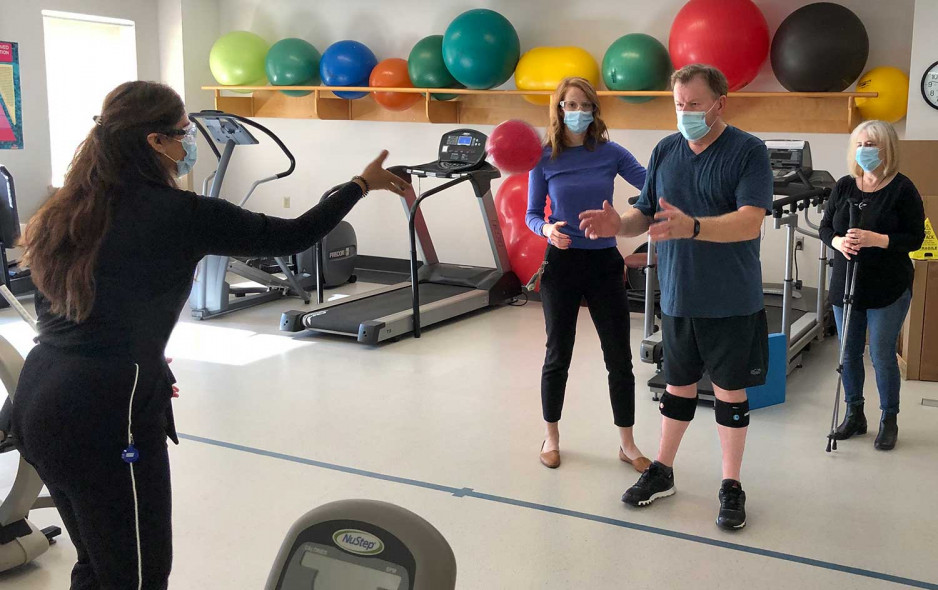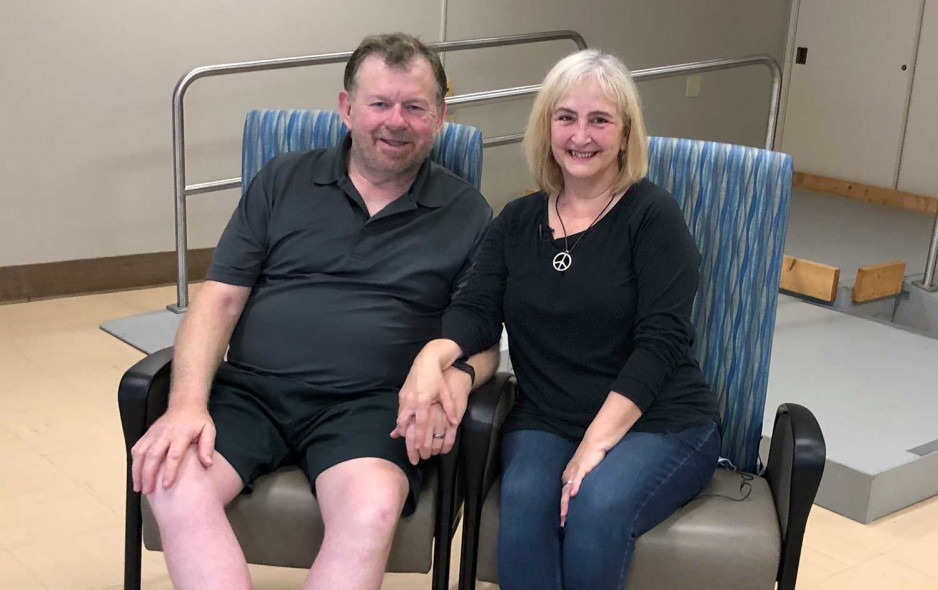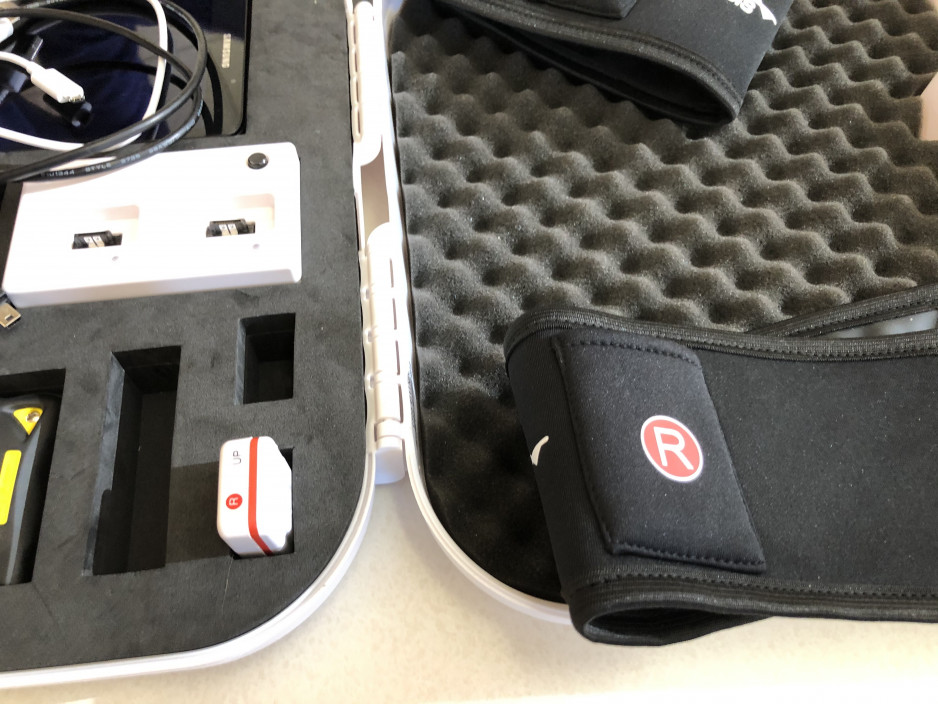When life changes in an instant
It started like any other day. Paul Garrett could never have imagined that by the end of the day, he would be paralyzed from the waist down.
On May 25, 2019, Paul was making coffee before another day’s work as an appliance installer when he noticed a slight tingling in the toes of his right foot. Being fairly fit and in his early sixties, he didn’t think much of it – until the numbness got worse, moving up to the base of his spine and down the other leg. Within 30 minutes of the initial sensation, he lost all feeling and function in his legs.
Paul was rushed to the nearest emergency department. For some reason, he knew his life had changed forever. He assumed he was suffering from a stroke.
“Before the ambulance arrived, it was terrifying and emotional. I had this feeling I would never walk again.”
It wasn’t a stroke but Paul was right about the life-altering ramifications. After days of testing, he was diagnosed with acute onset transverse myelitis, a rare neuroimmune disorder where inflammation damages the insulating material (myelin) covering the nerves along the spine. Without this protective coating, signals from the brain to the spine and back cannot occur.
Paul came to St. Joseph’s Health Care London’s Spinal Cord Injury (SCI) Rehabilitation Program at Parkwood Institute, where his care team partnered with him and wife Brenda to develop a recovery plan.
“They started from scratch with me, nothing was working when I got to Parkwood Institute,” says Paul.
When occupational therapist Charlie Giurleo asked Paul and Brenda what their initial goals for rehabilitation were, they were quick to answer. Paul wanted to get to his son’s wedding, just a month away. The team, and Paul, got to work, focusing treatments and exercises on learning how to get out of bed, transfer from the wheelchair to the car, and stand independently.
“I made it to the wedding, and I was even able to stand for a few pictures with my family. It was amazing.”
While the physical recovery was a significant hurdle for the Garretts, so was the emotional recovery.
“The SCI Rehabilitation Program team gave us wonderful support and information on how to live with a spinal cord injury,” says Brenda. “There was a lot of grief in the beginning for a life that was profoundly changed and would never be the same again, but we were able to move on and adapt thanks to the team at Parkwood Institute who were so positive and empowering.”
Emboldened by his care team, Paul was able to remain upbeat. Each time he met a new health care provider, he would tell them, ‘You’re on Team Paul now,’ as he held up his hand for a fist bump.” With the support of Team Paul, including his wife, a determined Paul can now walk with a walker.
Partnering with patients and family caregivers
As part of their journey at St. Joseph’s, the Garretts were asked to partner with the SCI Rehabilitation Program and Lawson Health Research Institute to design and test a new web-based platform for SCI patients and their caregivers called VIP4SCI.
With a goal to improve quality of care and the patient experience, the VIP4SCI platform includes educational resources tailored to SCI patients and their loved ones, self-management tools and trackers, and an interactive hub for two-way communication between the patient and care team.
“The VIP4SCI system will help us enhance our partnership with patients and families in care,” explains Charlie. “Patients are empowered to create action plans in the platform and use the education tools to help them manage their condition. Members of their health care team receive alerts when patients set goals so we can provide encouragement and guidance. Each patient is also assigned a ‘VIP coach’ to assist them in their care journey.”
“We are really excited about the possibilities of this project,” adds Lawson researcher Dalton Wolfe. “In our testing phase we are evaluating the usability of the system, while at the same time determining if the data we collect can be used to improve patient care and outcomes.”
Being involved in the design and testing of the VIP4SCI platform was meaningful to both Paul and Brenda. For Paul, VIP4SCI has allowed him to connect with his care team members, exercise virtually, receive messages and reminders, and access educational resources and links that have helped him make connections in his community. For Brenda, the benefits are equally powerful.
“It was incredible to learn that the team wanted my input as a caregiver, and that they were developing something to improve the emotional well-being of patients and their loved ones. So often, health care is all about the medicine, the treatments. This platform is like a bridge that links physical care and emotional care. It offers patients a way to stay positive and encourages them to more fully participate in, and navigate, their road to recovery.”
This story appeared in Issue 03 of My St. Joseph's. View more inspiring stories from the magazine.
What is VIP4SCI
- VIP4SCI is a new, virtual web-based health care tool aimed at transforming the quality of care for patients with spinal cord injury (SCI). The goal is to help patients make decisions about their care, improve their transition from hospital to home, and lessen secondary effects of their SCI.
- The platform addresses three needs for SCI patients:
- Easy access to a library of reliable SCI resources to support ongoing education
- Enhanced communication with their health care team (inpatients and outpatients) by allowing messaging and video calls between patient and team
- Support for self-management of their condition using goal-setting tools, medication trackers, and tools that allow patients to explore strategies to support ongoing skin health, pain management, physical activity and emotional well-being
- VIP4SCI was co-designed by patients, caregivers and health care providers in partnership with Spinal Cord Injury Ontario and ForaHealthyMe Inc.,
- A six- month trial of VIP4SCI is assessing how this platform supports patients and staff, particularly during the COVID-19 pandemic when virtual interventions are quickly becoming a must.
- VIP4SCI has been made possible by funding from the Craig Neilsen Foundation.


